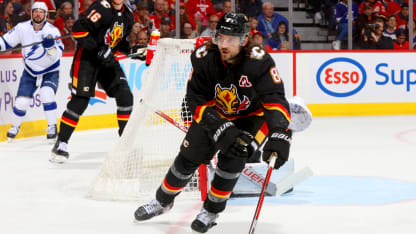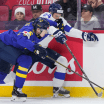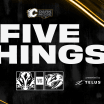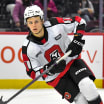It was a different level of urgency.
As much as the Flames carried the play - out-shooting, out-chancing and, in the simplest terms, out-playing the Bolts - the two-time winners and three-time defending Cup finalists had their moments.
Elite teams usually do.
And so, the intensity had to ratchet up.
"It was a really big response for us after going down 2-1 to a really good team," Chris Tanev said of Tampa's two goals in 48 seconds midway through the game. "To score right away, and then get the lead back before the period was out, is a really positive sign for our team.
"We were calm. We knew we were playing well. Two plays, two goals - it happens.
"When you think about all the things we were doing well up until that point, there was no reason for us to come off our game plan. So, we got after it and continued that right through to the end."
'EVERYONE STEPPED UP'
Tanev lauds defensive effort as Flames have one of their most complete games of the season vs. Bolts

© Gerry Thomas/Getty Images
A situation like that could very quickly spiral out of control. When Steven Stamkos - one of the NHL all-time great goal-scorers - leans into a slapper and beats Dan Vladar bar-down from the forward tees, it felt like one of those perilous moments that could awaken the beast.
If not on that sequence, then certainly when Vladislav Namestnikov struck only 48 seconds later to give the visiting Lightning their first lead.
But it didn't.
You wonder, then, if a scene like that could potentially have a more long-lasting impact. A sign of growth - of maturation - perhaps. As we get deeper into the season, these are the moments that will help galvanize a group. The Flames had two options at that point: Wilt and let their powerhouse Eastern counterparts take over, or dig deep in the reserves and show how how much they wanted it.
Offensively, they were as good as you can possibly be. They out-shot the Bolts 41-24 and finished with a dominant, 13-3 edge in high-danger scoring chances. And a big reason for that was how they buckled down, closed on Tampa's top players and made their life difficult.
"Kucherov, Point, Stamkos, Hedman, Sergachev… Those are really, really skilled players," Tanev said. "If you give them any time, any space at all, they're usually going to make the right play - a good play. We definitely tried to take away time and space as much as we could and play with the puck as much as we could."
If there was one critique from an otherwise complete effort by the Flames, it was the discipline factor. Typically, against a team with that kind of firepower, taking six penalties, including a double-minor in the third period, is not the recipe for success.
But that's where the homeside really excelled.
They limited the Bolts to only seven shots - total - on the powerplay, thanks in large part to the stellar, selfless work of the penalty-killers.
Eight of the Flames' 15 blocked shots came on the PK, with half of those tallied within seconds of each other while Blake Coleman was off serving the double.
First, it was Mikael Backlund knocking down a Victor Hedman blast. Then, only nine ticks later, Tanev - the Flames' leader in blocked shots and, presumably, ice-packs-per-60 - bravely stepped in front a Stamkos missile.
Less than a minute after that, MacKenzie Weegar put his body on the line to thwart a Nick Paul attempt, before Tanev did it again, flagging down an Alex Killorn backhand.
Down by the dressing room, the roars from the bench were as loud as they've been all season, with the Flames emerging from such a pivotal point in the game with their 4-2 lead intact.
"When you kill that - especially with the way we killed it - the boys on the bench get pretty fired up," Tanev said of the boisterous reaction. "The killers definitely brought some momentum for the rest of the game.
"Special teams can do that. If you have a good PP and score - and even if you don't score, but get some chances and control the play - it can sort of change the momentum of a game. You hem them in their end for two minutes, it tires their top players out. It can swing the momentum of a period very easily, regardless of whether or not you score. Just getting pucks to the net and are snapping it around.
"That's what I thought our powerplay did very well (going 1-for-4 on the night), and something our PK did well to prevent on the other side.
"In a game with lots of penalties like that, it's what you need to have success.
"We got some really big efforts from everyone out there."
The Flames went on to close the game out in style, even after Anthony Cirelli got a lucky one late to pull the visitors with one. Jonathan Huberdeau and Coleman scored into the empty net, with Noah Hanifin doing yeoman's work in his own end to strip a Lightning forward, clear the zone and - ultimately - record a pair of apples.
Justly deserved.
Everyone had a piece of that victory - and all because they came together and handled those key moments better than they have at any point this year.
"That four-minute kill was huge. Huge," Tanev said. "Like we were talking about, with momentum - that was one of those situations where it could have shifted very easily.
"Three-and-a-half minutes in, they get sort of a lucky bounce with that breakaway, but Vladdy shut the door. You're going to need timely saves like that - big saves on the PK, especially when you're playing a really good powerplay like they have.
"Everybody stepped up."
The win moved the Flames to a 22-16-9 on the year, with a date with Johnny Gaudreau and the struggling Columbus Blue Jackets on tap Monday at the Scotiabank Saddledome.
As impressive as Saturday's win was, it was also flat-out necessary. The Golden Knights, Oilers, Kraken, Avalanche and Predators all either won or picked up points as well, so the standings remain tight as they have all year.
But if the Flames continue to play with the kind of desperation and jam that they did against one of the league's best, it certainly bodes well for these final three games before the all-star break.
"Our goal is to catch the teams in front of us in our division," Tanev said. "We want to be a Top-3 team in the Pacific and we need to string together some wins to do that, because here in the second half of the year, there's more of those conference matchups and three-point games that make it tough to make up ground otherwise."


















